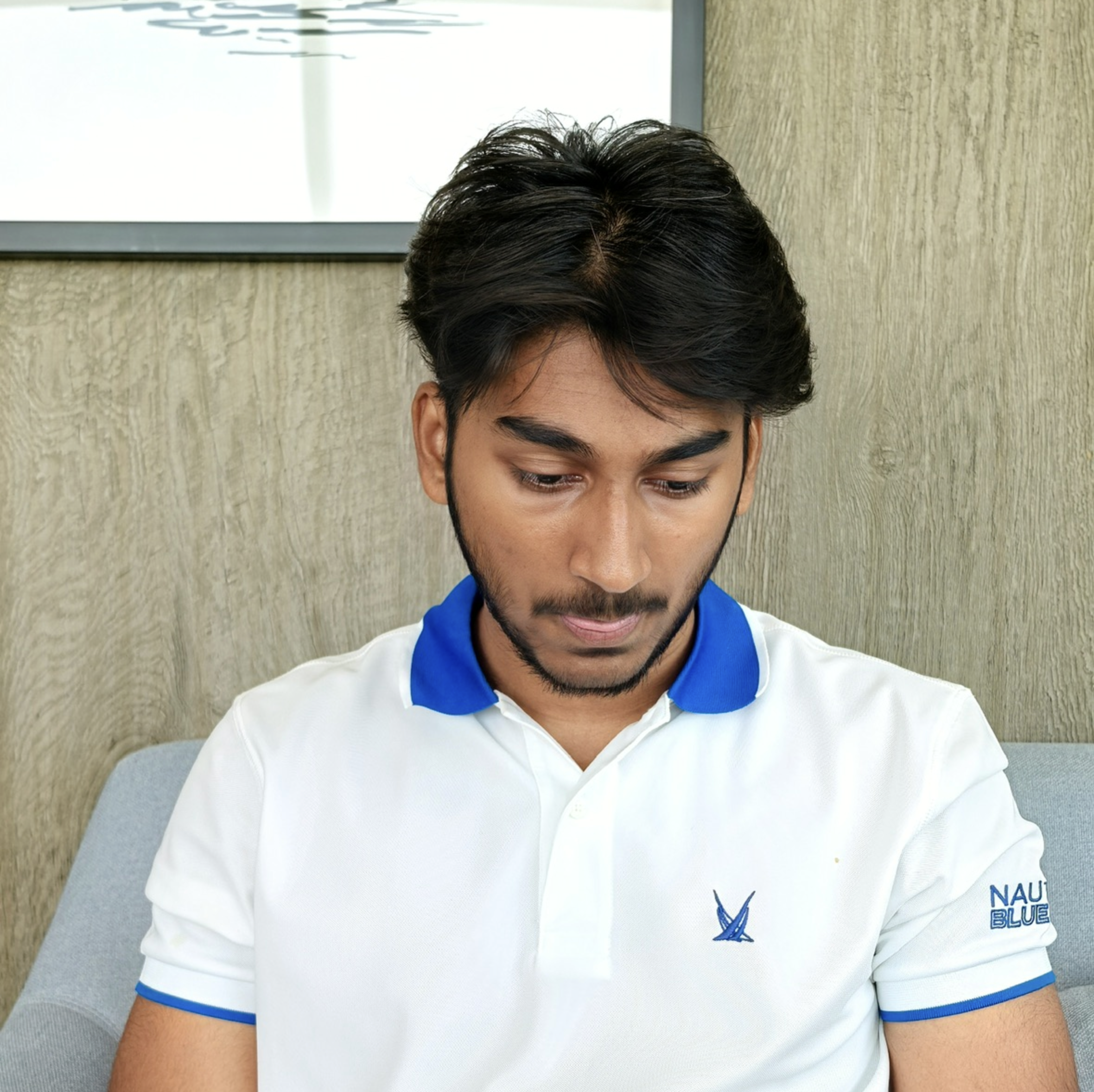My Academic Journey of learning across disciplines
As a DP2 student in the International Baccalaureate Programme, I’ve come to realize that the most meaningful solutions rarely exist within a single field — they emerge at the intersections. My academic journey spans Business Management, Global Politics, Computer Science, and Mathematics — disciplines I view not as isolated subjects, but as interconnected lenses that help me interpret the world’s complexities.
What drives me is the belief that technology without empathy is incomplete, that business without global awareness is fragile, and that precision without purpose is hollow. Through the IB’s emphasis on critical thinking and global engagement, I’ve learned to approach every challenge with both analytical rigor and cultural sensitivity — blending logic with perspective, and innovation with understanding.
Technological revolutions begin with a curious mind.
Technological revolutions begin with a curious mind.
Through the lens of my IB Programme, I’ve learned to see how businesses, governments, and technologies are deeply intertwined. Each subject I study offers a unique perspective — but together, they form a framework for understanding how ideas evolve into systems that shape our world.

Global Politics — Diplomacy in a Digital Age
I learnt that behind every algorithm or company decision lies a story of influence. Learning Global politics made me realise that technology is more than code — as a political force that shapes how nations negotiate, how security is built, and how people connect across borders. Studying digital diplomacy and cyber governance showed me that the real challenges of the future won’t just be technological — they’ll be ethical and human.

Business Management — By Understanding People
Business, to me, is creativity with direction. It’s the ability to spot opportunity where others see chaos and to turn insights into something that matters. Through Business Management, I’ve explored how strategy changes across cultures, how leadership works in uncertainty, and why empathy is often a company’s greatest competitive edge. It’s taught me that good business isn’t about profit — it’s about purpose, adaptability, and timing.

Computer Science — Turning Logic into Possibility
Computer Science is where my ideas take form. It’s the bridge between imagination and execution — a space where logic meets possibility. From coding applications to experimenting with machine learning, I’ve learned that programming isn’t just technical; it’s philosophical. It’s about building systems that reflect human needs, designing with intention, and turning problems into elegant solutions that scale.
.png?width=1232&height=1256&name=Mask%20group%20(18).png)
The Principles That Guide Me
The Principles That Guide Me
My journey has been shaped by mentors who challenged me to think independently, by experiences that taught me resilience, and by moments of curiosity that reminded me why I started.
-
01Continuous LearningGrowth isn’t about collecting knowledge — it’s about refining perspective. Every challenge expands the way I see, think, and create.
-
02Think in First PrinciplesI strip problems to their core truths and rebuild from the ground up — because progress begins where assumptions end.
-
03Lead AuthenticallyTrue leadership comes from integrity, clear communication, and empowering others to contribute their best.
-
04Stay Endlessly CuriousI don't just absorb information—I pursue knowledge with intention, constantly seeking to close gaps between what I know and what I need to know.
"The biggest risk is not taking any risk... In a world that's changing quickly, the only strategy that is guaranteed to fail is not taking risks."

The Beginning of My Business Mindset
The Beginning of My Business Mindset
My interest in business didn’t come from a textbook — it grew out of curiosity about how ideas turn into action. Attending entrepreneurship camps at Master’s Union was my first window into that world — where problems were solved overnight, ideas were tested in real time, and creativity met practicality. It taught me that business isn’t just about profits or plans; it’s about the mindset to build, fail, and rebuild smarter.
That curiosity only grew stronger when I attended GITEX Global and NorthStar Dubai, surrounded by startups pushing boundaries in AI, sustainability, and design. Seeing those founders pitch their visions made me want to experience that process for myself — to move from observer to creator.
So, I began experimenting. What started as curiosity turned into something real when I built ApniDukaan, my first e-commerce venture. It was more than a side project — it became a hands-on lesson in how business truly works. From writing product code to handling customer feedback, setting prices, and managing logistics, I learned that entrepreneurship isn’t about having all the answers — it’s about adapting fast, solving real problems, and staying curious enough to keep improving every day.

Learning to Think Like an Engineer at Scaler
Learning to Think Like an Engineer at Scaler
Joining Scaler was where curiosity turned into direction. It wasn’t just about learning how to code — it was about learning how to think. Balancing Scaler alongside my IB studies taught me patience, focus, and consistency. The program helped me understand how logic fits together like design, and how every problem, no matter how complex, can be simplified if approached the right way. What began as an interest in technology slowly became a mindset — one that values structure, reasoning, and building things that make sense.
My Learning Overview at Scaler:
- Built a solid base in Data Structures, Algorithms, and efficient problem-solving.
- Strengthened skills in Object-Oriented Programming and modular code design.
- Learned to design and integrate RESTful APIs for smooth system communication.
- Practiced real-world development with Git, debugging, and collaborative coding.
- Learned Low-Level Design (LLD) principles — focusing on modularity, reusability, and clean architecture.
.png)
Learning Through Real Work
Learning Through Real Work
My internship at UnyKloud, a tech startup focused on building scalable web solutions, was my first deep dive into how real products are developed and maintained. I worked as a React and Backend Developer, contributing to dashboard interfaces and optimizing backend systems using Node.js, Express, and PostgreSQL.
I was responsible for integrating RESTful APIs, improving data-fetching efficiency, and ensuring a smoother interaction between the frontend and backend. Working in a startup setting taught me how quickly systems evolve — and how important collaboration, documentation, and testing pipelines are in keeping everything stable.
What stood out most was seeing how every line of code, however small, connects to a real user experience. It changed how I view technology — not as something we build for ourselves, but as something we build to solve problems that matter.

Understanding Business Through People
Understanding Business Through People
My internship at CuriousRubik helped me see how technology and business thinking come together to shape real solutions. I worked as a Business Analyst, where my role was to bridge the gap between client vision and product execution. I collaborated closely with clients to identify their core needs and translated those conversations into clear deliverables — from Business Requirement Documents (BRDs) and MIRO flows to prototypes that guided our development team.
What I enjoyed most was being part of the full cycle — sitting in client meetings, validating requirements, and ensuring updates were tested and deployed on time. I learned that effective problem-solving isn’t just about gathering data or designing systems — it’s about listening deeply, asking the right questions, and simplifying complexity for others.
.png)
How Chess Masters Think Like Business Leaders
Discover the surprising strategic parallels between chess grandmasters and successful entrepreneurs—and
why this ancient game might be the ultimate business school you never knew you needed
.png?width=789&height=848&name=Mask%20group%20(2).png)